If you've outgrown shared hosting but aren't quite ready for a dedicated server, cloud VPS (virtual private servers) are the perfect solution. It reaches a balance between two extremes. With a cloud VPS, you get a share of a powerful server with its own resources such as RAM, CPU and storage. This ensures steady performance. It also gives more security and flexibility for your growing website or application.
In this blog, we explore the top 10 VPS providers in 2026. They are OperaVPS, DigitalOcean, OVH Cloud, Utho, Hostinger, InterServer, GoDaddy, Namecheap, Bluehost, and HostGator. We also tell you how VPS hosting works, the types of VPS hosting and the benefits of VPS hosting and its market overview.
How VPS Hosting Works
The server is the computer where your web host stores the files and databases. They're needed for your website. When a visitor tries to access your website, their browser sends a request to your server. The server then sends the necessary files over the Internet.
VPS hosting provides you with a virtual server. It simulates a physical server, but many users share the machine. Your hosting provider uses virtualization technology, like a hypervisor. It installs a virtual layer on top of the server's operating system (OS). This layer divides the server. It lets each user install their own operating system and software.
A VPS is virtual and private. You have full control over your partitions. It's isolated from other users by the operating system. You do it without rebooting.
VPS allows you to place your website in a secure container. VPS hosting gives you the same root-level access as a dedicated server, but at a much cheaper price.
Types of VPS Hosting
Cloud VPS hosting:
Cloud VPS hosting offers virtual servers in the cloud instead of physical servers. It's like your own space in the internet cloud, giving you flexibility and security. It's great for small businesses and individuals. It's always running smoothly without downtime. It does this by sharing the server load.
Managed VPS hosting:
With managed VPS hosting, the provider takes care of everything for you. They handle tasks like updates, security, and backups so you can focus on your website or business. It's like a team managing your server, making things easy and stress-free.
Unmanaged VPS hosting:
Unmanaged VPS Hosting puts you in charge of everything. You get the server hardware and software. However, you are responsible for managing it all. Although this gives you more control, it requires technical expertise. This option is good if you manage your own server and want to save money.
The Benefits of VPS Hosting Revealed
VPS providers offer new solutions. They've advanced cloud architectures. These provide the power, flexibility, and strong security needed for today's network growth. VPS servers ensure fast performance. A website on a VPS isn't affected by other users.
Scalability: Room to Grow
One of the biggest advantages of a cloud VPS is its ability to scale as your site grows. Your website may go viral and get thousands of new visitors overnight. A shared hosting plan may struggle to keep up. Traditional shared hosting in particular. However, a cloud VPS allows you to quickly add resources. You can add RAM and CPU cores to handle spikes in traffic and keep your website running smoothly.
When traffic drops, you can reduce it by not paying for unused resources. This flexibility is crucial for businesses with seasonal traffic or expecting rapid growth.
Performance: Speed Matters
A fast website is critical. A slow website frustrates visitors, lowers search rankings, and affects results. Cloud VPS hosting focuses on performance with the following features:
SSD Storage: Solid State Drives (SSD) are much faster than older Hard Disk Drives (HDDs).
Powerful processors: Modern processors help your website code run fast.
Sufficient RAM: Sufficient RAM ensures smooth multitasking, even when there are many visitors.
Reliability and availability: The backbone of your online presence. Your website must be available 24/7. That's why performance guarantees are essential. Most good cloud VPS providers aim for at least 99.9% uptime. This means your website will almost always be available. It will only be down for necessary maintenance or unexpected events.
For reliability, consider
Server Center Locations: Providers with multiple data centers around the world offer redundancy. If one data center has a problem, your site can move to another location to minimize downtime.
Redundant infrastructure: The best service providers embrace redundancy. They've got it at every level: power, network, and hardware.
Usage history: Look at user reviews and forums. They will help you understand the provider's hosting history.
Control and Customization
Customize your server environment. Cloud VPS offers more freedom than shared hosting. It lets you control your server. Here's what to look for.
Choice of operating system: You can choose the operating system. Most providers offer Linux distributions, such as Ubuntu, CentOS, and Debian. Some offer Windows Server. Choose one that you're happy to check out.
Superuser Access: Superuser Access gives you full control of your server. It lets you install custom software and change settings. This is important for developers or people with special needs.
Control panels: Control panels are popular. Examples include cPanel, Plesk, or custom solutions. They make it easy to manage your website and server. They also simplify tasks such as adding domains or creating email accounts.
Security: Your website has valuable information. This makes strong security vital for cloud VPS hosting. Consider the following.
DDoS Protection: Look for providers that use proactive DDoS blocking. It prevents your site from being overwhelmed with traffic.
Firewalls: A properly configured firewall will filter malicious traffic. Some service providers offer web application firewalls (WAF) to improve security. Malware scanning and intrusion detection are crucial. They help find and fix vulnerabilities before they grow.
Security Updates: Choose a service provider dedicated to quickly installing security updates. These updates are for the operating system and other server software.
Support: Support is your helping hand when things go wrong. Appropriate and experienced support is crucial during problem or incident recovery. Consider these factors. The key is to find value in the sweet spot. Cloud VPS prices vary, but these are the key factors:
Resource Allocation: Increase RAM, CPU cores, bandwidth, and storage. This leaves room to increase costs.
Managed vs. Unmanaged: Fully managed plans cost more. The provider manages updates and security. Unmanaged plans, where you manage the server, cost less.
Billing models vary: Some providers offer an hourly plan. Others require monthly or annual commitments. Look for flexibility.
Pricing should be transparent: Ensure you understand what the base price covers. That way, you can avoid hidden charges, like backup and bandwidth costs.
Top 10 VPS Providers in 2026 ranked
Are you on your way to find the right VPS provider for your needs? Our top 10 VPS providers of 2026 are ranked to make selection easier.
OperaVPS
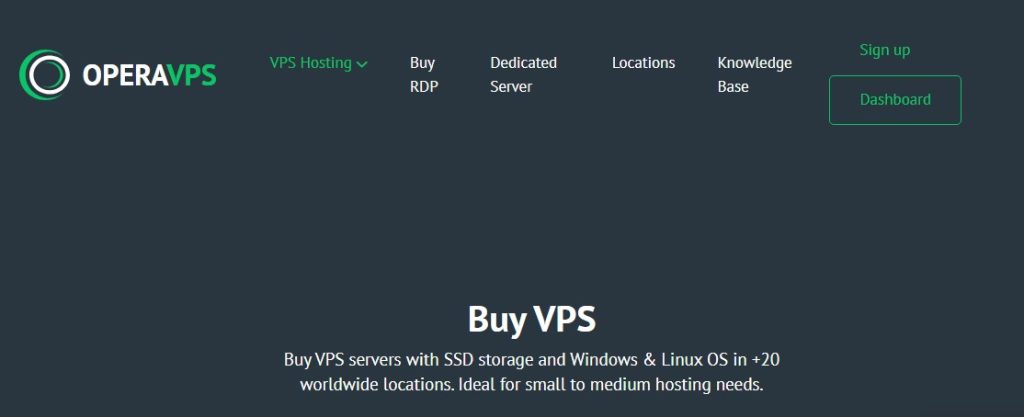
OperaVPS is a top VPS provider. It serves Linux and Windows. Its reliability and professionalism are well-known. OperaVPS stands out in the hosting industry with consistent performance and user-friendly features.
To ensure reliability, it uses advanced data centers. They are around the world. They have strict security and high-speed connections. Our focus on reliability means you get a smooth and stable hosting experience.
OperaVPS makes it easy. They provide dedicated resources and root access. They deliver super fast, in 5-12 minutes.
This means you can quickly set up VPS hosting exactly how you want it. At OperaVPS promise 99.99% availability and fast connections. Our plans include key features. These include DDoS protection, free backups, and various operating systems.
DigitalOcean

In 2012, the founders established DigitalOcean. Developers who need simple and cheap cloud computing can use it. Over the years, they've expanded their services. They now serve both developers and small and medium-sized businesses.
Their pricing model revolves around "droplets". These are customizable virtual machines. They allow users to adjust the CPU, memory, storage, and bandwidth as needed.
All droplets come with a 99.99% uptime SLA. They also have cheap options for load balancers, backups, and on-demand snapshots.
DigitalOcean is reliable for many needs. However, it's worth noting that they don't accept cryptocurrency payments.
OVH Cloud
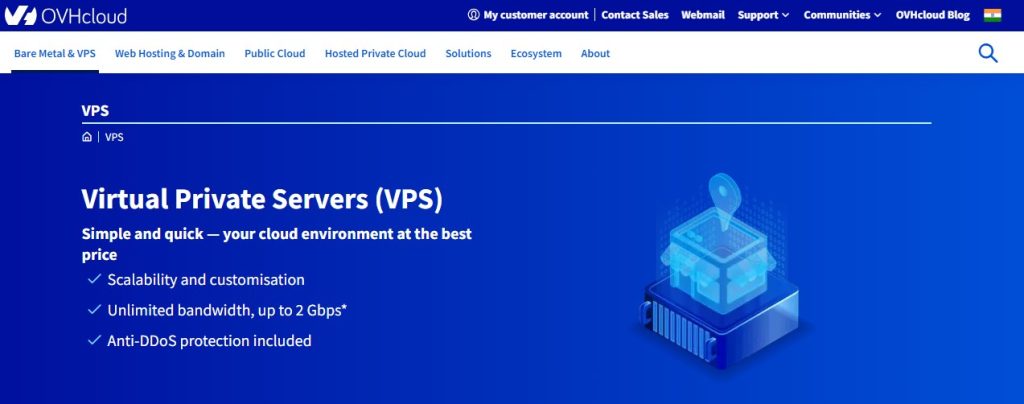
OVHcloud is the top service provider in Europe. It's third in the world in terms of physical servers. Their extensive network of data centers covers a wide geographical area.
OVHcloud offers features such as DDoS protection, customizable plans, and improved performance. But it's important to note that customers pay for their support plans. This may reduce the quality of their free regular support.
Customers appreciate OVHcloud VPS hosting services for their solid infrastructure and competitive pricing. Still, it's important to consider potential drawbacks. These include technical support, network reliability, security, and user experiences. Think about these before choosing OVHcloud for your VPS hosting needs.
Utho
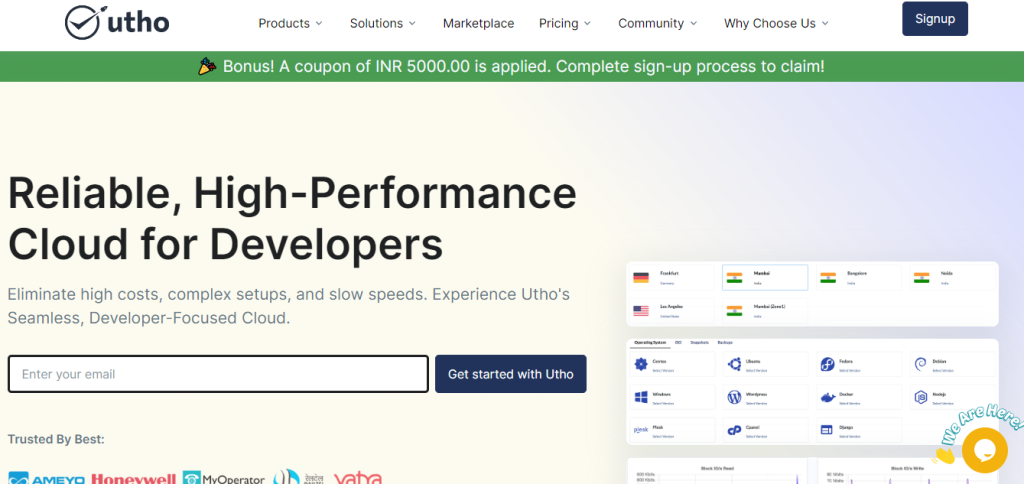
Utho is known for its affordable prices. This makes it an attractive choice for people and small businesses. They want to save on VPS hosting costs without sacrificing quality. With Utho Cloud, users can flexibly choose and set up their desired operating system. They can pick Linux, Windows, or another option. Also, Utho allows you to install and run custom apps and services.
It offers daily and weekly backups for added security and peace of mind. Utho makes server management tasks simpler. It provides cPanel and Plesk. It also has tools and dashboards. They track server performance, resource usage, and security events.
In addition, Utho offers 1 TB of bandwidth and 1 static IP address at no extra cost, helping users save up to 60% on cloud costs.
InterServer
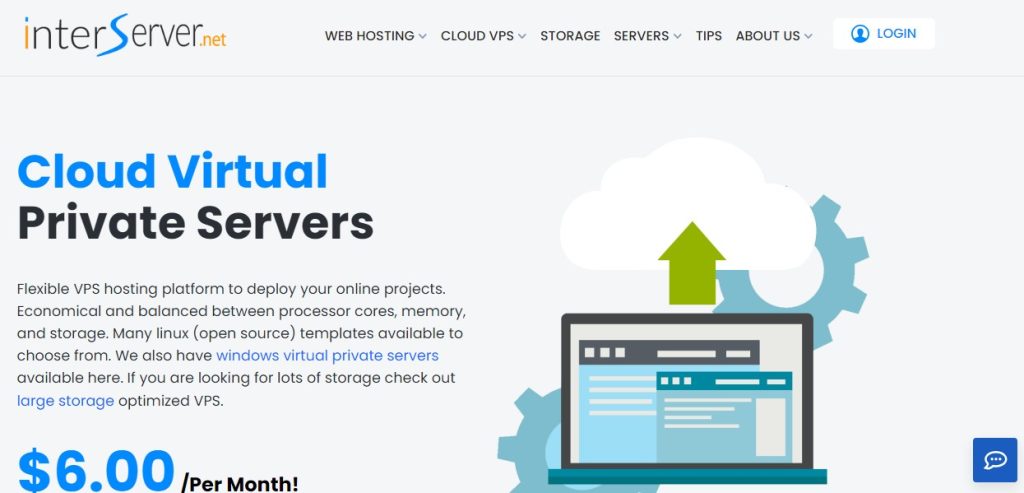
In 1999, InterServer founder established the company. It offers many types of hosting. These include shared hosting, VPS hosting, dedicated servers, and reseller hosting.
InterServer is known for its reliability, affordability, and customer service. But, the interface can be overwhelming. The dashboard has many parts that can confuse users. Each customer should only see products they've purchased displayed, which would be better.
InterServer only offers monthly fees. This can be a disadvantage for users looking for long-term contracts and discounts.
GoDaddy
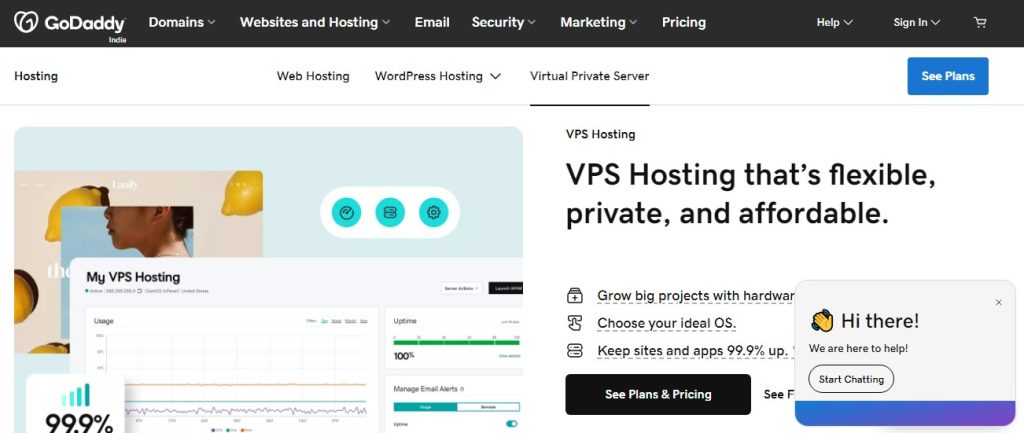
It is a famous hosting company and domain registrar. It often appears in big commercials, like the Super Bowl.
GoDaddy's VPS hosting includes semi-managed and fully managed servers. This helps beginners. They don't need to do manual VPS application and operating system installation.
Customers are generally very satisfied with GoDaddy's support team. Many positive reviews praise the helpfulness and efficiency of their support techs.
However, GoDaddy has its drawbacks. The company tends to sell aggressively. They use lots of pop-ups and extra features during the purchase process. Many of these features are unnecessary.
Hostinger
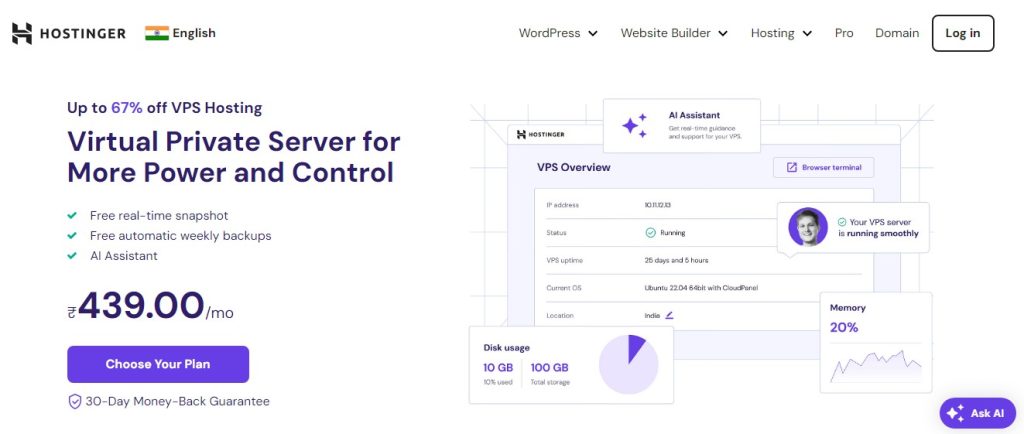
Hostinger's low prices are a key feature. They appeal to both individuals and small businesses. Hostinger aims to cut VPS hosting costs while keeping quality. It has proved attractive to cost-conscious users.
Hostinger's key features include NVMe SSD storage and AMD EPYC processors. It supports up to 100 websites and has weekly backups. It also has up to 32 TB of bandwidth and network speeds of up to 300 Mb/s.
Despite its affordability and user-friendly interface, Hostinger still has some limitations. Users have reported performance issues. These are mainly with shared hosting plans. They result in slower website load times during peak hours.
Namecheap
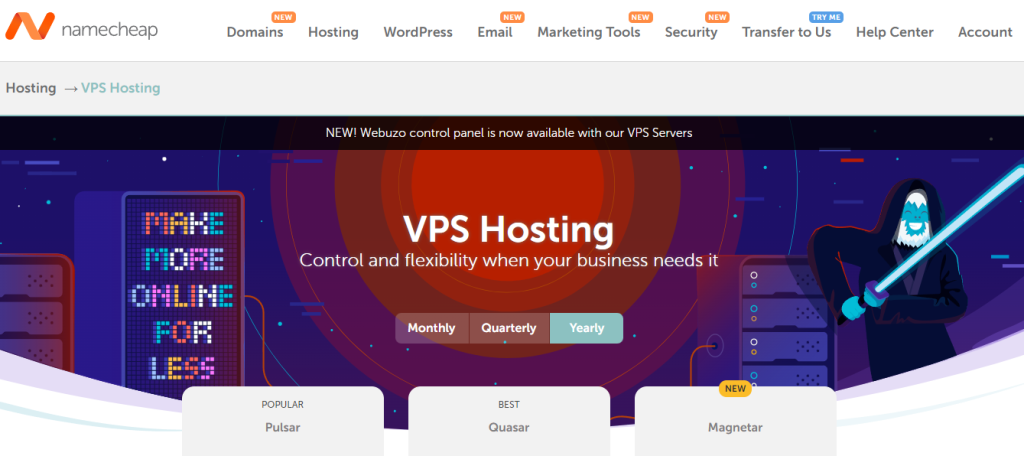
Namecheap offers three cheap VPS hosting plans. They start at $9.88 per month for a basic package. It includes 2 CPU cores, 2GB of RAM, and 40GB of SSD storage. It's worth noting that the prices on the VPS hosting page are for annual contracts.
Namecheap has attractive prices. But, its performance is just average. So, it's best for personal or small projects. However, it's important to mention that Namecheap's VPS hosting is self-managed. This can be scary for tech newbies.
Many customers have found that Namecheap's support team usually provides answers. They get them from their database. They do this instead of offering personal help.
Namecheap offers cheap VPS hosting options. But, the self-managed nature and average performance may not suit all needs.
Bluehost

They offer three Linux VPS hosting plans. All have unlimited bandwidth. The listed prices include a cPanel fee for a 36-month contract.
However, when you upgrade, the prices go back to the original. This makes Bluehost relatively expensive. Also, Bluehost lacks free SSL certificates. It also lacks global servers and free website migration.
HostGator

HostGator, the top Linux VPS provider, has declined in quality. Despite nice features like root access and powerful hardware. But, they have weekly backups (up to 20GB). But, people criticize their services for high costs and hidden fees.
HostGator costs much more than the competition. Their basic package includes 2 CPU cores, 2GB of RAM, and 120GB of disk space. Many loyal customers have left. They left because service quality and support got worse.
Also, HostGator's Windows VPS plans lack customization and flexibility. This makes them a challenge for businesses with different needs. The service has a fixed resource allocation. It may struggle to handle traffic spikes.
Virtual Private Server (VPS) Hosting Market Overview
Experts expect rapid growth in the VPS Hosting market from 2024 to 2030. VPS hosting uses virtual servers on physical machines. It provides resources like CPU and RAM to customers. , storage and bandwidth.
It offers the benefits of dedicated hosting. However, it lacks the high cost and complexity. The key features of a VPS are low cost, scalability, and flexibility.
Customers can set server settings to support different applications. Good VPS hosting depends on reliability, security, and good support. Service providers use a strong infrastructure. They also use strict security. These measures ensure continuous access and protect against cyber attacks. Content delivery networks (CDN) and fast SSD storage are features. They make sites faster and improve user experience.
The VPS hosting market is competitive and innovative. Service providers are constantly improving their services to meet changing needs. Trends like automation, container reservation, and cloud integration make VPS hosting better. They make it more efficient and customizable.
Wrapping Up
In all, picking the right VPS provider depends on your business goals. It also depends on your growth and financial plans. You must carefully evaluate each VPS option. Focus on factors like how easy it is to use, the quality of support, and customer feedback.
Utho excels in providing everything you need and more. Utho offers top performance and reliability. It also offers high availability and low latency. You can choose from many locations, operating systems, and specifications. And all at the most competitive prices available.
This review aims to give you the info to make an informed choice about a VPS provider. They will create a strong online presence for your business. Remember, if you research now, you can avoid future challenges. You will also lay the foundation for online success.



